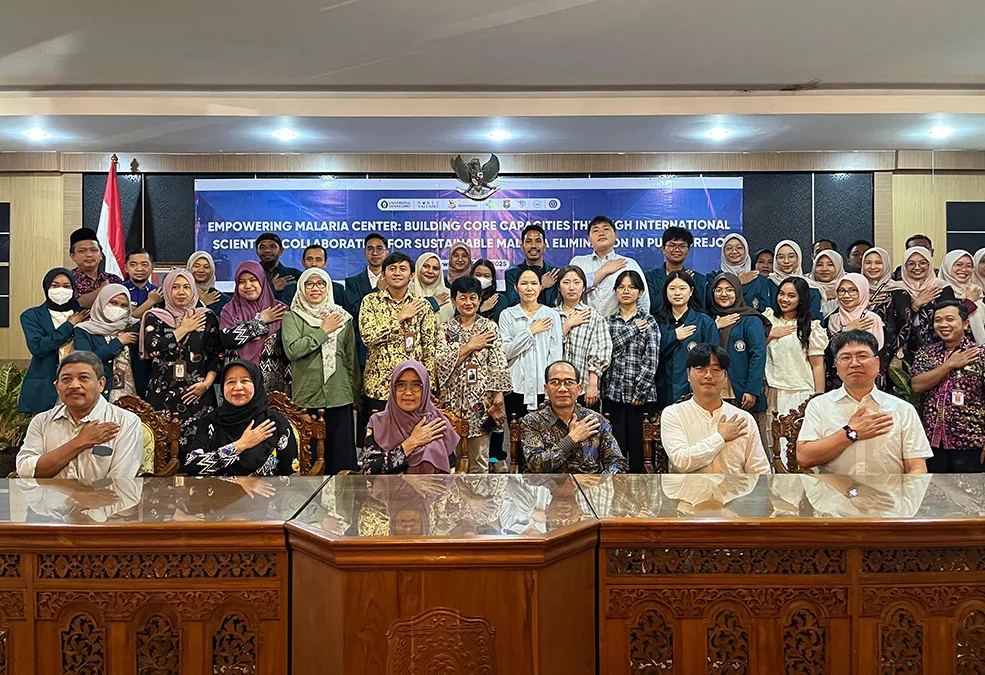UNDIP, Semarang (July 25, 2025) – Universitas Diponegoro’s Faculty of Public Health (FKM UNDIP) hosted a two-day collaborative program (July 24–25, 2025) with Yonsei University and Kangwon National University of South Korea to strengthen malaria risk prevention efforts in Purworejo Regency, Jawa Tengah. The event, themed “Empowering Malaria Center: Building Core Capacities Through International Scientific Collaboration for Sustainable Malaria Elimination in Purworejo,” marked an important milestone in international academic partnerships for public health development.
Day 1 – Inauguration of the Malaria Center (July 24, 2025). The first day focused on the opening of the Malaria Center in Purworejo Regency, a crucial step in the regency’s efforts to eliminate malaria. Key stakeholders, including representatives of the Purworejo Regency Government, the local Health Office, the Dean of UNDIP’s Faculty of Public Health, and students from UNDIP, Yonsei University, and Kangwon National University, attended the inauguration.
One of the highlights was the symbolic handover of essential molecular biology equipment—particularly a PCR machine—to enhance diagnostic capacity. This donation marked the first tangible outcome of the long-term collaboration between UNDIP’s Faculty of Public Health, the Purworejo Health Office, and partner universities in South Korea, aiming to close critical technical gaps and accelerate local malaria elimination efforts.
Following the inauguration, guests joined a laboratory tour and an intensive discussion session. Academic experts and government stakeholders discussed the Malaria Center’s strategic needs and opportunities for collaboration between academia and government to strengthen vector surveillance, diagnostic innovation, and community-based malaria control.
Prof. Jeon Bo-Young of Yonsei University expressed appreciation for the partnership, stating, “This center is a promising hub for collaborative research and education. We hope this joint effort not only enhances technical capacity but also strengthens community engagement in malaria elimination.”
Prof. Han Jin-Hee of Kangwon National University added, “Eliminating malaria is not only a scientific challenge but also a social one. Through international collaboration, we can combine expertise to develop sustainable strategies tailored to local contexts.”
Dr. Budiyono, Dean of UNDIP’s Faculty of Public Health, emphasized the program’s long-term vision. “This is not merely a ceremonial event. It is a concrete step toward building a resilient health system in Purworejo Regency. We are honored to work with international partners to enhance disease surveillance and improve health outcomes,” he said.
Day 2 – Community Empowerment in Kedunggubah Village (July 25, 2025). Continuing its mission of community health empowerment, the second day focused on outreach activities in Kedunggubah Village, Kaligesing District. The Kaligesing subdistrict head attended the program, along with representatives from the Purworejo Health Office, UNDIP faculty members, and residents.
The event also welcomed an international delegation, including Prof. Jeon Bo-Young (Yonsei University), Dr. Sezim Monoldorova (Yonsei University), Prof. Han Jin-Hee (Kangwon National University), Dr. Jun Hojong (Kangwon National University), and four students from Yonsei and Kangwon.
Their participation enriched the program, which included community education on non-communicable diseases such as hypertension and diabetes, as well as communicable diseases like malaria. The activities featured knowledge assessments, interactive health education led by UNDIP’s Master of Epidemiology students, and free health screenings for early detection of hypertension, diabetes, and potential malaria infections among villagers.
A notable highlight was the scientific discussion session, where Prof. Jeon Bo-Young, Prof. Han Jin-Hee, Dr. Jun Hojong, and Dr. Sezim Monoldorova shared insights on vector-borne diseases. The discussion emphasized the diversity of mosquito species found in Kedunggubah Village and the importance of understanding local ecological risks. These findings raised community awareness about malaria vectors in their environment.
Dr. Muh Fauzi, Head of the Master of Epidemiology Study Program, shared his perspective: “This collaboration provides an invaluable platform for our students to engage in real-world public health practice directly. By working alongside local communities and international academics, they gain critical insights into the ecological and social dimensions of disease prevention. It also reinforces our commitment to producing epidemiologists who are globally competent and locally grounded.” (Public Communication/ UNDIP/ Faculty of Public Health)










